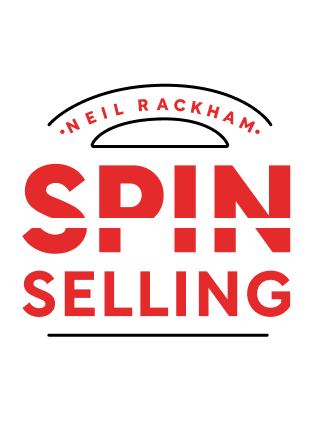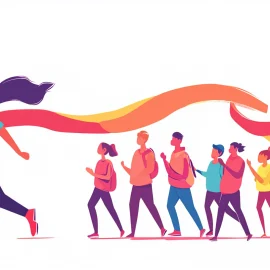

This article is an excerpt from the Shortform summary of "Spin Selling" by Neil Rackham. Shortform has the world's best summaries of books you should be reading.
Like this article? Sign up for a free trial here .
You know about SPIN selling, but what are SPIN questions examples? Can they help you learn how to ask SPIN questions?
SPIN is a sales strategy based on asking the right questions. With these SPIN questions examples, you can practice asking SPIN questions, and learn how they work.
SPIN Questions Examples
SPIN questions examples can be extremely useful when you’re practicing the SPIN method. Examples for each method (Situation questions, problem questions, implication questions, and need payoff question) are below.
Situation Questions
Situation questions are intended to gather facts and background information about the customer’s situation. They’re the first questions asked during a sales call. They’re aimed at getting to know the customer personally and learning about the business and how it operates.
SPIN questions examples are:
- “How long have you been in your position?”
- “Do you make buying decisions?”
- “What’s your company’s annual sales volume?”
- “What equipment do you use? How old is it?”
Situation questions are the easiest and most straightforward questions to ask, so they tend to be overused by inexperienced sales reps.
Problem Questions
Problem questions are intended to reveal implied needs. They ask customers what their problems and frustrations are.
SPIN questions examples include:
- How is your current equipment working for you?
- What are the shortcomings of your system?
- Does your aging equipment create problems for you with quality or speed?
Research indicates that:
- In all sales, problem questions impact success more than situation questions do.
- In smaller sales, problem questions are a predictor of success. The more problem questions a rep asks, the more likely she’ll make a sale. When reps get training to ask problem questions in small sales, their sales jump.
- In successful small sales, reps ask twice as many problem questions as reps do in unsuccessful small sales.
- In larger sales, problem questions don’t have a major effect on sales success (discussed below).
It makes sense that problem questions would contribute more to sales success than fact-finding or situation questions do—because when you uncover problems you can address, you have something relevant to offer the customer.
Implication Questions
Implication questions are a tool for building implied needs into explicit needs big enough to require action. These questions explore the larger implications, ripple effects, or consequences of a seemingly small problem, making it bigger.
SPIN questions examples are:
- Could the limitations of your equipment be costing you new business?
- What effect does that have on quality?
- Do your equipment problems increase turnover, or make it more difficult to hire operators?
- Is this leading to increased costs?
Research indicates that:
- Implication questions contribute strongly to success in larger sales.
- They increase the customer’s perception of value: when a problem seems big, your solution seems more valuable or worth the price.
- They’re more difficult for reps to ask than situation or problem questions because they challenge customers.
Most sales reps stop probing after they’ve asked situation and problem questions. In small sales, after they’ve uncovered problems or implied needs, reps typically move on to offering a solution—which may be sufficient to make a sale. However, problem questions aren’t enough in large sales where your solution is expensive.
Need-Payoff Questions
While implication questions emphasize the magnitude of the problem, need-payoff questions emphasize the value of your solution.
These are positive questions about the benefits of solving a problem using your solution
SPIN questions examples are:
- How would this help you?
- What would be the benefits of solving this problem?
- What makes this solution appealing to you?
Research shows that:
- In larger sales, need-payoff questions contribute strongly to success.
- By encouraging the customer to identify the benefits of your solution, these questions make your solution more appealing.
- Influencers who make your case to the decision-maker respond well to need-payoff questions.
- Customers rate sales calls with a lot of need-payoff questions as helpful and positive.
- Need-payoff questions contribute strongly to success in large sales where a good ongoing relationship is important.
Practicing SPIN Questions Examples and Tips
Using SPIN questions effectively requires planning. Here are some SPIN questions examples to consider:
- In planning a call, ask yourself, “What problems can I solve for this customer?”
- Write down at least three possible customer problems that your solution could address.
- Write down several problem questions you could ask to reveal each of the above problems.
Plan Implication Questions Tip
Implication questions are difficult, if not impossible, to formulate on the fly, so plan them in advance using these SPIN questions examples. Remember, these questions contribute strongly to sales success. To plan implication questions:
- Write down a problem the customer may have.
- Write down potential consequences or effects the problem might have.
- For each consequence, write the question it suggests. For example, if the problem is a shortage of qualified people to do something, the implication questions might be whether the shortage will lead to the company incurring overtime costs, or to having difficulty filling vacancies.
Need-Payoff Questions Tips
Need-payoff questions are difficult for reps to get used to asking, despite the fact that, of all the SPIN questions examples, customers react to them most positively. Here are a few tips:
- Don’t ask need-payoff questions before you’ve developed the customer’s problems. Sometimes reps start a sales call with questions like, “If I could show you a faster way to handle your billing, would you be interested?” Feeling manipulated, the customer will respond defensively. You have to develop and magnify needs before asking need-payoff questions.
- Don’t ask need-payoff questions for which you don’t have the solution—that is, questions about a need your product or service doesn’t address. For instance, don’t ask why the customer needs to produce double-sided copies if your company’s machine only copies one side. You’ll succeed only in making a need you can’t address stronger.
- The time to ask a need-payoff question is when the customer reveals a need you can meet. However, at that point, many reps jump right into talking about their solution instead of letting customers identify how having a solution would help them.
Practicing Need-Payoff questions
You can improve your skills with practice and effort. Here’s a simple practice exercise:
1) Ask a friend or colleague to help you (he doesn’t need to know anything about selling).
2) Think of a need your friend has—for instance, choosing a new car or vacation destination, or changing jobs.
3) Ask need-payoff questions to get the person talking about the benefits of addressing the need. For example, ask, “Why do you think it would be a good idea to get a new car?” “What features do you need that you don’t have now?”
You may be surprised to find that just practicing this exercise with someone can build the other person’s enthusiasm to the point of action. Need-payoff questions are that powerful.
Need-payoff questions are more generic than implication questions, which are focused on a customer’s business, so it’s useful to have a supply of need-payoff questions ready. Some examples are:
- Why is this important or why does it matter?
- How would that help the situation?
- Would it be useful if …?
- How else could this help you?
- How much would it save if….?
SPIN questions examples are a part of the SPIN strategy, and they help set you up for success. Use these SPIN questions examples anytime you need to practice or refresh.

———End of Preview———
Like what you just read? Read the rest of the world's best summary of Neil Rackham's "Spin Selling" at Shortform .
Here's what you'll find in our full Spin Selling summary :
- What the SPIN in SPIN Selling stands for
- How to demonstrate real value to the person you're selling to
- How to get commitment from your customer to close the sale fast






